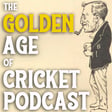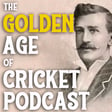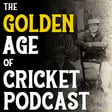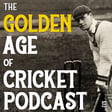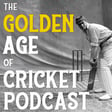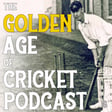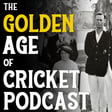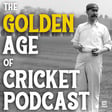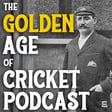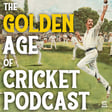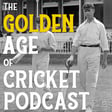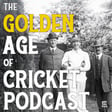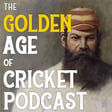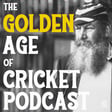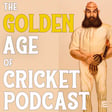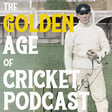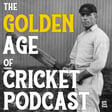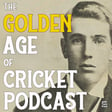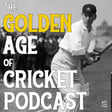Introduction and Significance of Cricket Brothers
00:00:07
Speaker
Hello and welcome to this episode of the Golden Age of Cricket podcast. My name is Tom Ford. Throughout the long history of cricket, there are countless examples of brothers who have reached the pinnacle of the game's highest format.
00:00:21
Speaker
Australia in particular has produced its fair share. Charles and Alec Bannerman, the Chapel Brothers, the War Twins, to name only a few. During the Golden Age, one pair of brothers experienced both the highs and lows of all life and cricket had to offer.
Introducing Rick Smith and His Work
00:00:38
Speaker
The triumphant and tragic stories of Harry and Albert Trott are definitely worth retelling, and my guest today will help us in this quest. Rick Smith is a former A-grade cricketer from Launceston, who since his playing days has been a cricket historian, writer and photographer.
00:00:57
Speaker
He is the author or co-author of more than 25 books and numerous articles on various aspects of cricket history, including Australian Test Cricketers and Great Days in Test Cricket.
00:01:11
Speaker
He has also written on various aspects of Tasmanian cricket and was co-author of the book Tigers Roar, celebrating the 150th anniversary of Cricket Tasmania.
00:01:23
Speaker
Rick's book from 2010, Blighted Lives, the story of Harry and Albert Trott, won the Australian Cricket Society's Literary Award. And as he proudly told me, he is the only Tasmanian to have won this award.
00:01:38
Speaker
Rick, welcome to the podcast. Thanks, Tom. Good to be with you.
Motivation and Research Behind the Trott Brothers
00:01:43
Speaker
Well, and it's great to chat to you So let's talk about the Trott Brothers and your excellent book. what What impelled you to write a biography of Harry and Albert Trott?
00:01:54
Speaker
And was it always going to be a double biography? no it wasn't actually. Initially, I started with Harry um and I wanted to know how you go from captaining Australia to being in a mental institution within 12 months.
00:02:10
Speaker
I wanted to know what happened to him. And then I realised that you couldn't talk about Harry without talking about Albert because their lives are intertwined and Albert's life is just as depressing as Harry's.
00:02:25
Speaker
Yeah, and it's it's a really interesting read. When we talk about the research that you undertook for this book, did it lead you down any particularly interesting paths?
00:02:37
Speaker
and um And were there any trot family members that were able to assist you in your research? I think I got very lucky, actually. I was trolling a website, a genealogical website,
00:02:51
Speaker
And I came across a lady who was asking about Harry Trott. And I made contact with her and I found out that she was his great-granddaughter. And she was fascinating about their life after, or the later part of Harry's life and what happened to the family after he died. So that was that was a piece of luck.
00:03:12
Speaker
And um yeah, a lot of research, a lot of websites, a lot of talking to people.
Trott Family History and Surprising Ancestry
00:03:17
Speaker
and One that viewers in ah or listeners in Victoria might be familiar with is Stuart Trott, who was an AFL footballer with St Kilda for many years. He's a direct descendant of Harry's.
00:03:28
Speaker
Well, let's um let's cast our mind, or certainly let's ask you to cast your mind back to your book, and let's begin way back. so ah what can you tell us about the Trott family history um and the Trott brothers' ancestry, particularly how the family came to Australia?
00:03:50
Speaker
Well, I assumed, because I found a record of them arriving from Liverpool, that they were English and that they had come from England. ah But that isn't actually the case or proved not to be the case.
00:04:01
Speaker
And they actually came from the West Indies. And that was a surprise for a start. And and they initially they had sailed from Antigua to England and then from England to Australia.
00:04:14
Speaker
And Harry and Albert's father, Adolphus, his father, John, was a teacher. and um And he he was a teacher in Antigua. But it seems like that the family actually came from Bermuda,
00:04:28
Speaker
in originally, and he had moved there as a teacher. And what was particularly fascinating was the fact that ah John Trott's wives, both of them, were manumitted slaves.
00:04:44
Speaker
Right. so and And they came to Australia with one of them, and she was listed on the yeah on the arrival certificate as a mulatto. which is a combination of yeah a what usually a white man and a black woman, and usually that black woman is a slave.
00:05:02
Speaker
So who would have thought that the captain ah of Australia yes and was the the grandson of a slave?
Trott Family's Life in Collingwood and Cricket Beginnings
00:05:11
Speaker
Yeah, and it it was something which surprised me. i have to admit, reading about it, I wasn't aware at all. And I'm sure many of my listeners listening now are probably ah have raised eyebrows learning this for the first time. Have they not read your book? There is one other bizarre relative that you might like to know about.
00:05:31
Speaker
There's a guy called Nicholas Trott, who ultimately became the governor of the Bahamas. And he yeah he was described by the governor of Barbados as a man of unproned unfounded ambition and and little principle.
00:05:46
Speaker
And he did deals with pirates. He smuggled goods. He ended up leaving an estate of about £50,000, which was enormous money in in those days.
00:05:57
Speaker
So we've got piracy, slavery, slavery. an incredible family background, which I had no idea about. I thought I was going to get farm labourers from England or something. yeah and yeah And then I end up with this. ah it's It's like the making of a Hollywood film, to be honest, because as you say, often the backstory is quite straightforward, but this was anything but.
00:06:19
Speaker
um you You mentioned the boy's father, Adolphus, um already. So he was... ah more than likely the greatest influence on their ah early life, of course, but particularly in terms of cricket.
00:06:35
Speaker
um And as you say in your book, and I'm going to quote you, Adolphus Trott loved cricket. He was a man besotted by the game, but like many who fall under its spell, he wasn't very good at it.
00:06:48
Speaker
So what can you tell us about Harry and Albert Trott's childhood growing up in the Melbourne suburb of Collingwood? Well, first, I think, yeah, Collingwood's a working-class suburb.
00:07:01
Speaker
ah And so you've got a lot of tradesmen, labourers, people like that living there. Adolphus ah obviously loved cricket, and and there's lots of people in cricket who just adore the game but couldn't play it to save their lives.
00:07:16
Speaker
and And he was probably one of them. They would have had a basic education at a local school, um and then... And sport obviously would have been part of their early childhood and growing up into that.
00:07:30
Speaker
and They did have one tragedy. One son, William, drowned while swimming in the Yarra when he was seven. and So they they lost one. um But he got them in, Adolphus got them involved in a club called the Capulets.
00:07:45
Speaker
Now, you have to explain what the Capulets were. Originally, they were the Collingwood Plasterers Cricket Club. And I don't know where the name Capulets come from. Someone must have read Romeo and Juliet or something. I didn't know if there was another two another club called the Montagues, but you never know.
00:08:03
Speaker
And they started to play there. Initially, it was Gustavus, Harry's elder brother, who began to play there. And then Harry joined and and some years later, because Albert's a bit younger,
00:08:16
Speaker
He played for them as well. So Harry was playing for them when he was about 12 or
Harry Trott's Cricket Journey
00:08:21
Speaker
13. And there is a photo, a team photo with Harry in the front of it. Also in the photo is the Australian Test cricketer, Jack Hodges, who was their star player and a controversial character of some note.
00:08:36
Speaker
And also in the team was Jack Ryder's father. Wow. i for them ae So, yeah, they played in what was called at the time a junior competition.
00:08:47
Speaker
Now, that doesn't mean the same as juniors today um because juniors today means young kids. But in terms of that time, it means a level below the senior clubs, which would have been, you know, Collingwood, Melbourne and those sorts of things.
00:09:04
Speaker
Hmm. And they did quite well. I mean, Harry started probably as a bowler. He was probably more a bowler than a batsman. And um he started and with the ball and then gradually developed into a batsman.
00:09:16
Speaker
And Harry was, ah you know, there are a few brothers or siblings. We're primarily talking about Harry and Albert, of course, Harry being the elder of the two. So his his career with the Capulets obviously started first and Albert followed suit. They both went through the Capulets, I'm assuming.
00:09:37
Speaker
Yeah, both the by the time Albert got to the Capulets, Harry was probably playing. Harry was playing for Australia. Yeah, right. Okay. So, you know, there there is that there is that age difference between them.
00:09:48
Speaker
So Harry um does seem to have this almost meteoric rise ah through the ranks of cricket. By the 1885-86 cricket season, he's playing for the Victorian colonial side and he's playing under the captaincy of Harry Boyle, ah which is a name I know many of my listeners would know, one of the pioneers of the early days of Test cricket.
00:10:12
Speaker
And then suddenly by the next season, Harry is opening the bowling alongside the great Fred Spofforth, uh, in an Australian 11 side against a touring English side, uh, which is quite remarkable really at such a young age.
00:10:30
Speaker
Was Harry's rise to this national side as straightforward as it seems, or were there hiccups along the way? It doesn't seem that there were too many hiccups.
00:10:40
Speaker
Um, I guess that Australia were looking around for for some good new young players. They'd had some pretty unsuccessful tours to England in 1884 and 1886. They hadn't done particularly well.
00:10:53
Speaker
The players that had won the Ashes, like Spofforth and Murdoch and and those guys, were getting older. And so they were casting around for some young players. And Harry's form for South Melbourne was pretty good.
00:11:06
Speaker
So he got a chance with Victoria, did okay, and he got picked on the 1888 side to go to England. And I think Australians have a tendency to take someone on an Ashes tour who's regarded as a player of promise.
00:11:22
Speaker
It's happened a lot in the past, and and you know you could probably think of a number of players who've gone on on the basis that we thought they might be good. Some are and some are not. then And Harry ended up on the 1888 tour, which was not a terribly successful tour, but he did okay.
00:11:41
Speaker
He scored over 1,000 runs. He took 43 wickets. he He did quite well. The problem with that tour and also his next one was the fact that Australia's leading bowlers were Charlie Turner and Jack Ferris.
00:11:55
Speaker
And captains just seemed to bowl them eternally. Yes. on the basis that they were the best bowlers, they were going to get all the wickets and no one else really got much of a look in. So, you know, when it came to the tests, Harry didn't take a wicket and I think he only scored
Harry Trott's Playing Style and Leadership
00:12:12
Speaker
37 runs. So he didn't do particularly well in the test, but he did okay outside that.
00:12:16
Speaker
um But, you know, there were other bowlers on the tour who didn't get much of a go either. So, yeah. Yeah. And it is one of the peculiarities of the golden age. Well, really from any early period of cricket history, when you look at the scorecards, you wouldn't see it today because they all need to be rested and rotated. But when, when a couple of bowlers were on song, they would stay on. And sometimes scorecards are complete and, and innings has just been performed by two bowlers, for example, and they've each bowled something like 60 overs. It's unheard of today.
00:12:52
Speaker
um And I think Charlie Turner took something like 290 odd wickets on the on the tour. Yes. Yeah. You know, and I think Ferris was about 170 180 something like Just ridiculous numbers.
00:13:05
Speaker
Yes, yeah. And so this was the 1888 tour, which... um Percy MacDonald was the captain. Correct. um do What can you tell us about Percy MacDonald in terms of possibly what um Harry learnt from him? Is there anything we can muster?
00:13:25
Speaker
put Well, he was he was a history teacher or or expert, and that was his background. He was pretty good batsman. ah On that tour, he was the best batsman.
00:13:38
Speaker
He faded out a bit later on, but in the early 1890s, he emerged playing for Queensland and did quite well and unfortunately died early from a heart attack. His captaincy probably wasn't that great. He just threw the ball to Turner and Ferris and let them do it. and um Yeah, so so probably...
00:13:59
Speaker
I think if Harry learned anything from him and also from the next tour, it was not to be over-reliant on too few individuals. Every ship will find a hover and a bike will find one too.
00:14:22
Speaker
If you're enjoying this podcast, perhaps you'd like to support it by buying me, Tom Ford, a coffee. Every little donation helps with the production costs and also inspire me to keep going.
00:14:34
Speaker
You can support by donating as little as $5. Visit buymeacoffee.com slash goldenageofcricket. let's actually assess the type of cricketer that Harry Trott was. We've touched on it already that he batted and he bowled.
00:14:51
Speaker
Um, what can you tell us about his style of batting and bowling and, and was he actually classed, uh, certainly through modern eyes of modern eyes, what we would term an all rounder?
00:15:05
Speaker
I think, uh, he, you'd call him a sound player rather than a spectacular one. Um, he He wasn't an enormous hitter. He tended to play shots. He's very good on the drive.
00:15:18
Speaker
He's very good player square of the wicket. But he didn't have the thunderous power of his brother. and And so it was more like working the ball, ah building in innings. that That was his batting.
00:15:31
Speaker
His bowling was basically leg breaks and straight balls ah because the the googly hadn't been invented at that point. It seems he was quite accurate, but it seems he was quite slow through the air.
00:15:44
Speaker
um Not overly quick, but the accuracy helped. He he bowled few bad balls, and and I think that helped him a lot rather than the amount of vicious spin or anything else. he he was accurately frustrated batters.
00:15:59
Speaker
they'd try and hit him out of the ground, charge down the pitch and be stumped or caught in the outfield. He got WG Grace stumped was with a ball like that. I think at the start of his career, and don't know if true all-round is right because I don't think he would have got a game as purely as a bowler.
00:16:17
Speaker
He started out as a bowler who batted and he ended up being a batsman who bowled. And so he switched it around. So if you look at the kind the the kind of role,
00:16:28
Speaker
It's someone who could roll their arm over. What we're doing with Tasmania's Bo Webster, with Cameron Green, with Stephen Mark Waugh, they wouldn't get a game as a bowler.
00:16:40
Speaker
but yes But added to their batting, to have someone in the top six who can bowl a bit is very useful. And that's what I think Harry became. it's bit like a reverse, uh, Wilford Rhodes, really, you know, he start starts as this great bowler and then in a few years he ends up opening the batting and then goes back again, ah down to the bottom of the list. It's, uh, it's not as infrequent as we think in the golden age. I mean, they, um there was a high proportion of what we would term as all rounders today.
00:17:12
Speaker
um you know And I've mentioned this many times on the podcast. um We often class the likes of Trumper and McCartney as batsmen, and they are some of the great batsmen of all time, but they also bowled and bowled quite a lot.
00:17:27
Speaker
But we don't talk about their bowling. Yeah, and and Joe Darling said he would have bowled Trumper a lot more, but he was worried about his health. Well, exactly. um ah Prophetic, really. um very So ah back to Harry Trott. He's again included on the tour to England, this time in 1890.
00:17:47
Speaker
um This time it's under the captaincy of the great Billy Murdoch. who is actually at this point in time residing in England. He's moved over there, um which is handy for him.
00:17:58
Speaker
ah Doesn't have to endure the six-week trip on the ship. um What can you tell us about um the 1890 tour of England, ah particularly Harry's performances, and whether he actually learnt anything from Billy Murdoch's captaincy?
Australian Cricket in Transition and Trott Brothers' Impact
00:18:17
Speaker
He probably learn what not to do rather than what to do, aren't Billy, ah one of the problems with Billy is, as you say, he was living in England. He didn't really know the players. He hadn't seen a lot of them.
00:18:29
Speaker
um He didn't know what they could do. He didn't know what they were capable of. And like his predecessor, he was besotted with Turner and Ferris, who he obviously had seen. And so Turner and Ferris bowled and everyone else fielded.
00:18:43
Speaker
and And in the first part of the tour, Harry hardly got a bowl. He hardly used him. Later on in the tour, he used him a little bit more. ah Hugh Trumbull was also on that tour and he wasn't used properly at all and we know the kind of bowler he developed into.
00:19:01
Speaker
So the other problem with Murdoch was that he he never seemed to have a settled batting order. he he would change um He would change the order at at what was a whim, you know.
00:19:14
Speaker
oh Charlie Turner, who was probably... a number seven or number eight in terms of ability, he decided that he would be an opening batsman. So he sent him in first and in test matches. It would be like us opening the batting with with Pat Cummins or Mitchell Stark or someone like that.
00:19:33
Speaker
and And that would just it would be foolish. And so he had people batting all over the place. No one knew their role. Kenny Byrne, who's always worth a chat, Kenny got on the tour as the reserve wicketkeeper, having never kept wicket in his life.
00:19:47
Speaker
through an amazing set of circumstances that are too complicated to go into. But Kenny Boone was good bat. and And he played in the test matches. He picked him in the test matches and batted him at 10 and 11.
00:19:59
Speaker
but It's hardly making the best use of what you've got. So i think ah I think the lessons that Harry took from from those captains um would have been to try and get a settled order. And and these days we talk about role-playing and and a player knowing their role in a team and And I think it would have been impossible under Murdoch to know what your role was, apart from Turner and Ferris, who bowled until they dropped.
00:20:26
Speaker
But, you know, to have a role, to have a batting order, to have some sort of a plan, not just throw the everything up in the air and see what happens.
00:20:37
Speaker
Yeah, and the 1890 tour is ah really interesting tour because you start to see the changing of the guard, which you noted. I mean, you've got ah Billy Murdoch, who was part of the original um you know test sides, and he's still going, but he's he he doesn't really know the players because he's based in England.
00:20:57
Speaker
But you start to see the young players coming through like Hugh Trumbull. And then over the next few seasons, Some of those old players like Jack Blackham start to then ah retire.
00:21:08
Speaker
And that's when the fortunes really start to begin for Australia, not always in terms of victory, but in terms of competitiveness, because the 1880s weren't the greatest test series.
00:21:23
Speaker
um They were often very one-sided. So yeah, that 1890 tour is a really interesting one to dissect. Yeah, once they once they lost Spofforth after winning the Ashes, and when Spofforth stopped playing in the mid-1880s, I think the attack lacked its sting.
00:21:44
Speaker
Turner and Ferris did it, but they weren't any batsmen. They weren't the equivalent batsmen. But then you get guys like Alec Bannerman starts to be more important. ah Jack Lyons becomes a good player. And then you get other players like...
00:21:57
Speaker
ah like Harry Graham and Callaghan, and then ultimately to k Clem Hill, Joe Darling, and people like that, and Australia gets back to the top and towards the end of the eighteen ninety s Yes, and then there's the, I suppose, on the back of what we've just discussed, you get the consistency of Joe Darling's captaincy because he then does, he leads, what, three tours to England, thoroughly knows the players inside out, which is the opposite of what we've just been discussing with the first two tours that Harry went on. So, um so ri after that tour, um
00:22:34
Speaker
Obviously, he comes back and he plays ah domestic cricket, colonial cricket for a number of seasons. And in the 1892-93 season, there are two milestones in, I suppose you could say, the Trot story. The first is that Harry captains Victoria.
00:22:52
Speaker
for the first time and the other is and that Albert Trott, his younger brother, makes his debut for the Victorian side and I believe they weren't exactly in the same match um but they happened in the same season. So is it possible to work out whether Harry was responsible or at least involved in ah granting Albert his debut for Victoria?
00:23:19
Speaker
You'd have to think he was involved in some way. i mean, Harry gets the captaincy because by 1892, 1893, he's a very experienced cricketer. He's done two tours of England. He's played a number of test matches.
00:23:30
Speaker
and And he's been around. He knows what's what. and And so I think it's quite right that he became captain. I couldn't see anyone else in the team who deserved it more or a ahead of him.
00:23:43
Speaker
And then... And I guess when you look at the younger brother of a test player, you'd be silly not to have a look at him, wouldn't you? And Albert had actually been going okay with, firstly, the Capulets, and then he moved to South Melbourne and um and had been doing quite well there. So to put him in and give him a chance was was not a bad thing. I mean, you think about um the younger brothers of star players, right?
00:24:13
Speaker
you know, Austin War, for instance. And I mean, yeah you look at them, whether they make it or not, um you have to look at them. And and also the sons of players too.
00:24:24
Speaker
um It is just a sensible thing to have a look. Some of the magic might be there. You never know. I suppose in modern terms, everything seems to go through the system, as in ah whether you're the relation of a star player, you still have to prove your worth. But back in the golden age and the early days, that there there were quite a few controversies of brothers of players being involved in tours or perhaps getting a spot in the colonial side when it wasn't warranted. And you can see it all through the newspapers. ah
00:24:58
Speaker
George Giffen's brother, Walter, of course, The Giffen thing is legendary because he yes he had opted out of the two previous tours of England and they wanted to get him to go because he was the best all-rounder in Australia, even though he was arguably the most difficult cricketer in Australia.
00:25:17
Speaker
And they wanted to get him to go. And his only condition to go in 1893 was if his brother Walter went as well. And so Walter Giffen gets an Ashes tour And he's probably barely worth a game for South Australia.
Politics and Organization of Cricket Tours in the 1800s
00:25:32
Speaker
He did very little for South Australia. was a decent grade player. But he gets a tour because if he doesn't go, then George doesn't go. and they wanted George. it's ah It's quite remarkable. And it's not something you would see today. I mean, imagine. It definitely isn't.
00:25:48
Speaker
Yes. ah You know, the the brother of one of Australia's test players going on tour just because they want the other one to go. I mean, it's quite, it's quite unique, but, ah and it's not the only example from this period. We could, we could name a few, but we won't.
00:26:03
Speaker
You have to remember too, that these tours at this time were private enterprise tours yeah organized by the players as a sort of limited company where they, would put in an amount for expenses and then they would split the profits at the end of it.
00:26:16
Speaker
So this is not something that's at this time that's really coordinated by um by a central organisation like Cricket Australia. There was the Australasian Cricket Council But as one rider said, it was like a toothless cat but not quite as vicious.
00:26:32
Speaker
And and they it just had no influence and the players just ignored them. And, you know, the ah the modern phrase would be boys club. And certainly in those early days you could you you get this sense that they're all just good mates and that they want to go on an adventure together and help each other out. um And it's during the that...
00:26:53
Speaker
there begins to be some order and obviously with the formation of the, um you know, the board eventually at the turn of the century, then all sorts of issues happen, which we've spoken about on this podcast before. MUSIC PLAYS
00:27:14
Speaker
take a whole lot with i killed and
00:27:22
Speaker
Rick, something else we've talked about a lot on this podcast, it seems to be a common denominator, ah is the great test series of 1894, 95. Many pundits think it is the start of the golden age, the so-called golden age.
00:27:39
Speaker
um And it is also important in the trot process. family story because it's where Albert makes his entry into the test arena for the first time. he yeah He doesn't play in the famous first test in Sydney, but he makes his debut in Adelaide, which is the third test.
00:28:03
Speaker
yeah And it to this day is still noted as one of the great test debuts. What can you tell us about Albert Trott's debut? Well, his debut is quite spectacular, but with Australia at this point, we're 2-0 down in the series.
00:28:16
Speaker
So I guess they were looking for a spark, something like liven them up and get them going. and And it seemed like Albert was the man given the job. He was, I mean, it was an amazing debut.
00:28:30
Speaker
I mean, he started by making 38 not out and adding 81 for the last wicket with Sid Calloway. He didn't get a bowl in the first innings because Giffen and Callaway bowled unchanged. And this is the thing. Giffen is the captain at this stage.
00:28:43
Speaker
And Giffen always thought that Australia's best option was to bowl Giffen. Yes. You know, and there is that story about when someone had the nerve to suggest a bowling change, he said he'd go on from the other end, which might be apocryphal. But but actually, if you look at Giffen's career, it's the sort of thing that you might expect him to say.
00:29:02
Speaker
In the second innings, he got 72 not out in 90 minutes. And that enabled them to set England 526 to win. And then he bowled 27 over straight, and took eight for 43 and won the game by 382 runs. So if you think about that, that is an extraordinary debut.
00:29:21
Speaker
And I think to this day, i know one of my listeners will correct me, but it is still the greatest test match bowling figures in what in an innings at the Adelaide Oval. I think those eight wickets. I mean, there have been more wickets taken by an individual bowler throughout the the entire match.
00:29:40
Speaker
um I think someone once took like 14 wickets. ah But those eight eight for 43, I think you said, I think is still the best single figures ever. In an innings, it probably is.
00:29:52
Speaker
I mean, Bob Massey, I think he got eight for 50-odd and eight for 80 in his taboo. So I don't know of anyone that went underneath eight for 43 on test taboo. You know, people have got five wickets and things like that, but nothing yes nothing at all like that. and And Harry's comment was at the end of it, who'd have thought the kid could do it?
Albert Trott's Unique Playing Style and Achievements
00:30:15
Speaker
Yeah, but those those figures are legendary and still and I love seeing graphs come up yeah you know on TV today and you see a Trot still at the top of the table. It's quite remarkable.
00:30:27
Speaker
um Like we did with Harry, Rick, let's just pause for a moment and assess the type of cricketer that Albert was. um So he's clearly got skills ah in both areas as a batsman and a bowler.
00:30:43
Speaker
um How is he different to his older brother, Harry? Well, they're completely different characters, actually. ah Albert is a lot more aggressive in terms of the way he played cricket. His batting was always aggressive. he His desire was to hit the ball as hard and as far as he could.
00:31:02
Speaker
And and there was less science to his play than there was to Harry's. So you've got a very aggressive player, but it is very hit and miss. Yeah. Some days it worked, some days it didn't.
00:31:14
Speaker
His bowling, it's hard to actually categorise it because, but They'll say, the sites will say, oh, he was medium fast, but he was quite capable of bowling a very quick ball if he wanted to.
00:31:26
Speaker
And ah so he varied his pace a lot, but he could also swing and seam and cut the ball. So he he had all these variations. The problem was that as he got older, he tried too many of them all at once. It was like an over of licorice all sorts. And he And it rather than work on a plan, he'd just run up and bowl something and then bowl something different the next bowl and you'd get an over of six different deliveries.
00:31:53
Speaker
It wasn't a player who worked tried to work a batsman out. He'd just run up and bowl whatever he felt he'd bowl at the time. and So I guess he yeah he would have lacked his the tactical skills that Harry possessed in in working out a player.
00:32:09
Speaker
There are photos of his bowling action. George Beldham in Great Bowlers and Fieldsmen, he photographed Harry in 1905. And even though he's starting to get past his best, what you see is a very low action, a low body action, almost a round arm swerve. um He doesn't stand up tall and bring the ball over the top. It's more a crouched delivery stride.
00:32:35
Speaker
So he's ah he's a little bit hard to categorise as a bowler, but for a few years he was stunningly effective. Yeah, and I'm glad you mentioned those Beldum photographs. I think he um there's a great one of him fielding as well, taking a one-handed catch possibly or attempting to take a one-handed catch. So he must have been you know had very very large hands, yeah.
00:32:59
Speaker
and you can see it i think in again one of those photos he's holding the ball um not actually uh in action not bowling but just standing there holding the ball posing like they often did and you can just see his large paw gripping the ball like he was uh he possessed some very large hands yeah and strong fingers which would allow him to cut the ball and um Yeah, and the variation of pace, if you look at him, he's strong.
00:33:26
Speaker
And he would have been able to put varying degrees of shoulder into the ball. And he would, as we say in modern parlance, hit the bat hard or comes onto you quicker than you think.
00:33:37
Speaker
Yes, and and um and if we think of the two brothers and compare them, there was a bit of an age difference. Harry was um you know quite a few years his senior, but also different body types as well. Harry always comes across as quite almost a rotund sort of style or sort of body figure, whereas Albert was quite lean. Is that fair to say?
00:34:01
Speaker
ah think it's fair to say um Albert got less lean as he went on. and he He put on weight towards the end of his career. But yeah, they they are completely different types. If you look at photos of them, they're very different. And and it's different body shapes, different personalities, really different people.

